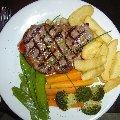Love Me, Love My Food
Money. Politics. Religion. Sex. Approaches to parenting. Personal habits such as sloppiness or compulsive tidiness.
Disagreements over any of these can wreck a relationship. And in the United States, there's another factor that's driving a wedge between partners. It's food: arguments over how much, and what kind, to eat. As a New York Times article on the subject put it, Culinary camps have become so balkanized that some factions consider interdietary dating taboo.
Some people become diehard vegetarians, for example - the Times writer calls them "vegangelicals. " They become fanatical about fresh fruit and veggies and mock their partners for enjoying a good steak or hamburger. In return, the meat eaters say nasty things when their partners toss tofu or sprouts into the shopping cart.
Sometimes one partner loves to cook elaborate recipes, and the other prefers predictable meals, fast food or simple dishes like pizza. Or one will try to impose a weight-loss diet on the other, in a campaign to become healthier. The other sees no need to abandon satisfying though less healthful foods such as ice cream and beer.
Tensions can rise in dual-religion households about not only such matters as the religious instruction of children, but also dietary rules and customs.
And let's not even talk about the arguments that ensue over shopping and how much is spent doing it. But there's a bright spot for those whose relationships come apart because of disagreements over food. There's a whole category and many online pages devoted to something called break-up food. Of course, it's fattening comfort food like chocolate cupcakes and cheese-covered popcorn. I'm Ted Landphai.

